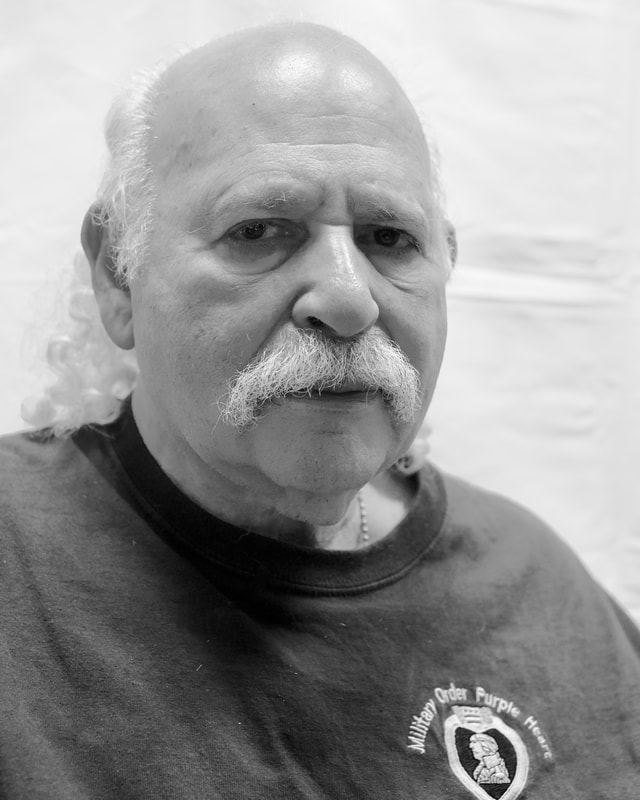SP 4 Jerry Ganz
US Army 1st Division
Combat Engineer – Purple Heart
Vietnam ’66-‘67
US Army 1st Division
Combat Engineer – Purple Heart
Vietnam ’66-‘67
Jerry Ganz was born in the Brownsville section of Brooklyn, NY on January 24 ,1945. His family later moved to the East New York section of Brooklyn where he grew up with his two sister. His father had a truck route delivering bread, rolls and cakes and his mother was a homemaker. Jerry’s father fought in WW2, an uncle was killed in the Battle of the Bulge and another uncle fought in Korea.
Jerry described growing up in Brooklyn during that era as “wild times.” “It was hanging out on the street corner, playing stickball, playing Johnny on the pony, stealing cars.” Jerry attended the East New York vocational High School and he wanted to be a machinist. After he graduated high school he was drafted and was inducted at Whitehall Street in lower Manhattan. He headed off the basic training at Ft. Gordon in Georgia. “It was tough. I wasn’t in the shape I should have been, and you weren’t used to taking orders and being yelled at all of the time”. After eight weeks he headed to engineer training at Ft. Leonard Wood in Missouri. Jerry enjoyed engineering school. They taught you how to build bridges and how to use a lot of explosives. Lots of explosives and you blew thing up. That was fun.”
After eight weeks of combat engineering school Jerry was sent to Vietnam. He flew from California, to Hawaii, to Guam and eventually on to Tan Son Nhout Air Force Base near Saigon in South Vietnam. I asked what Jerry remembers when he first walked off the plane. “It was hot as hell and second thing was they were loading the coffins on the planes. It was a rude awakening. They gave us a gun and sent us to Division rear.”
Next was a truck ride to Phuoc Vihn Base Camp just north of Bien Hoa. The GI’s spent 5 days at the camp getting acclimated to the heat and humidity. “It was well over 100 degrees.” The men were broken up into teams of 5 or 6 doing long range reconnaissance. These patrols could take 5 to 10 days. Helicopters would drop them into the jungle and they would have to walk back. “You took as much water and ammo as you could carry.” Jerry said the food was so bad it was less of a priority.
These patrols often took enemy fire. About nine months into his tour, and Jerry was riding on a personnel carrier as they moved through an active area. The Patrol was ambushed and came under heavy enemy fire. The Vietnamese fired RPG’s to disable the tank in the front and the back of the column. The personnel carriers were in the middle and now stuck. They also discovered the road had been mined. “I couldn’t tell you how long it lasted how long it lasted. It felt like a lifetime.” In the heat of the battle Jerry did not realize he had been hit in the foot by shrapnel from a mine. The fire fight went on for some time before air support came and eliminated the enemy. When the action stopped Jerry felt numbness in his foot and he looked down to discover the top of his boot had been blown off and his foot was covered in blood. A Corpsman came and bandaged his foot, Jerry gave himself a shot of morphine and he, along with the other injured GI’s were medevac’d to a hospital outside of Saigon.
Jerry remembers having his fatigues cut off and the doctor inserting and IV in his arm and telling him to count back from 10. “I was probably gone by 9.” The doctors couldn’t save all of his toes on his injured foot. Jerry remembers waking up from the operation and smelling steak. He was hungry. Between the dehydration, daily patrolling and not much to eat, Jerry had gone from 175 lbs. to 125 lbs. He spent roughly two weeks in that hospital eating and recovering. He was then flown to a hospital in Yokohama, Japan recovering and eating more. “They fed you as much as you could eat.”
After four months he was flown back to the US to Ft. Belvior in Virginia. With only a few months left in his tour and restrictions on how much walking and standing he could do, Jerry was assigned to stockade duty transporting prisoners. Four months later he was discharged.
Jerry returned to New York and went to live with an uncle in Rockland County, NY selling scissors to drug store chains in Connecticut and New Jersey. He eventually became a partner and later they sold the business. Jerry has an entrepreneurial spirt and has owned a body shop and gun shop. Jerry is now fully retired and remains active with a veteran’s group in Nyack, NY. “I’m busy.”
I asked Jerry if he recalled the prevailing mood of the country when he returned from Vietnam. “It was the good times. It got worse later on. At the beginning we weren’t called baby killers and all that sort of thing.” I asked Jerry what he thought of his time in the Army. “It was interesting times. I’m glad I went. We had great camaraderie, especially over in Vietnam because you depended on the person next to you tremendously. We had some very good sergeants.”
Jerry returned to Vietnam with a group of six veterans. “You’d ride down the road in a bus and you’d see rice paddies and you’d have flash backs about the rice paddies, the only difference was there were telephone poles now.”
Thank you Jerry for you service to your country in the hot jungles of Vietnam.

